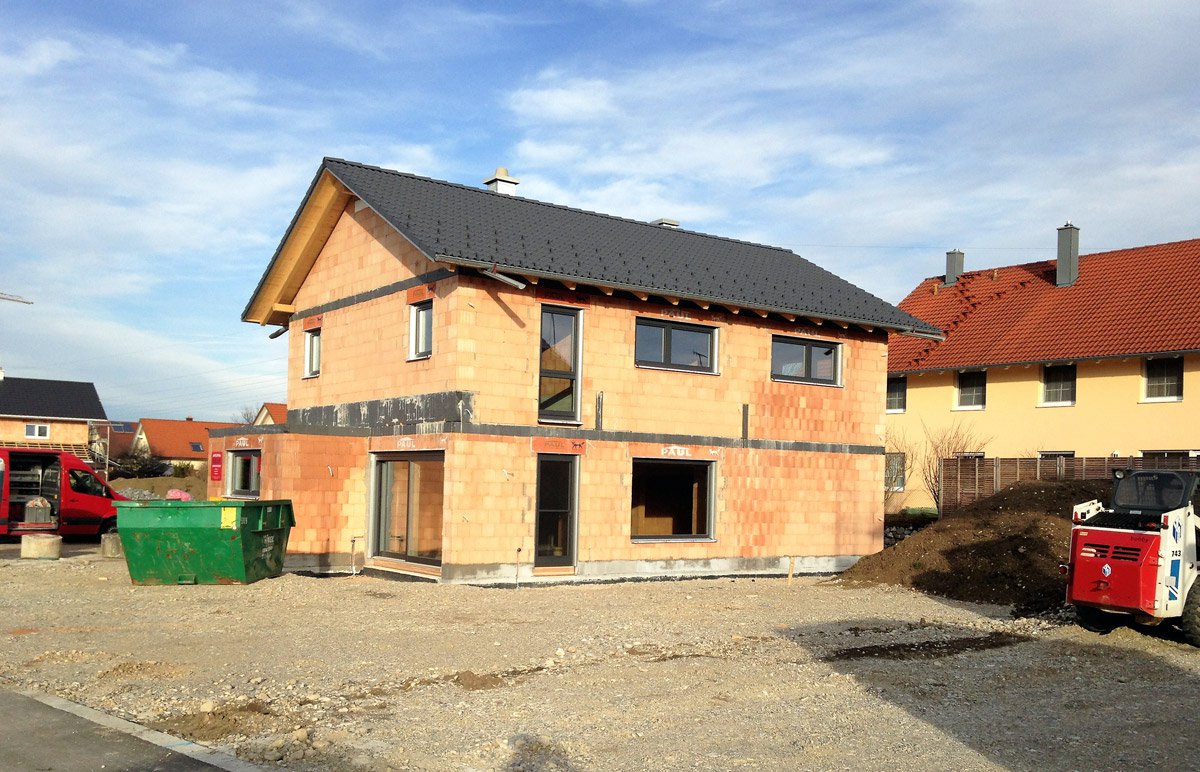Builders often lack experience and background knowledge when building a house. When building a house, you want to do everything right from the start. For this, conscientious planning that takes into account all aspects – first and foremost the construction costs – is important. Our house construction checklist helps to get a first overview of all aspects relevant for house construction.
construction financing
The current interest rate situation is particularly attractive and suits builders – there is a lot of construction going on. In the case of construction loans, a good mix of debt and equity financing is particularly important. This is because the ratio of equity and debt capital ultimately also determines the total interest costs and the term of the loan.
20 % – 40 % Equity
20% – 40% of the total cost is a good guideline for equity. Having as much equity as possible strengthens your negotiating position when it comes to getting a loan. The loan is then also lower and there are fewer costs due to interest. It pays to save up front.
Estimating your own financing potential
Can the monthly installments of the loan be serviced comfortably over the entire period? Your own financing potential is quickly estimated: all monthly fixed costs deducted from your income. Sufficient margin is always good! There may be purchases out of order or the urgent need for a vacation. Here you will find more information about planning construction financing.
The main credit models are:
- the annuity loan
- the full repayment loan
- the building society loan
- the constant loan (a variant of the building savings loan)
- Financing without equity
- Promotional loans
Here you will find a detailed explanation of each credit model.
Plot
To build a house you need a suitable plot of land. The very subject of land involves a number of important questions. Already at the property planning errors and additional costs can be avoided!
The new center of life
The new property is the future center of life. Here, the following is important: social infrastructure, public transport network, routes for work and leisure, leisure facilities, schools, kindergartens and, last but not least, the land use plan (this provides information about what is planned for construction in the surrounding area in the future).
The development plan
Building regulations apply to every plot of land: You can’t just build whatever you want on a plot of land. Development plans determine the type and extent of building use and vary from place to place – sometimes even from street to street. Here you can find detailed information about the development plan.
Even if there is no specific development plan for a particular plot of land, there are provisions under building law. These are regulated within localities by Section 34 of the Building Code as well as the various building codes of the federal states or statutes for specific municipalities.
The development of the land
The majority of plots sold are already developed. However, buyers should clarify the degree of development of the land in detail. Only developed plots may be built on and the cost factor of development can be quite high. The development of a plot of land refers to: Connection to supply and disposal networks: Water/gas/electricity/sewerage, road and telephone networks.
Particular attention should be paid to costs incurred! This is because cost traps can arise with the so-called development contribution due to the apportionment of costs. This is because it can take a considerable period of time and affect the new owner completely unexpectedly. Here you will find everything you need to know about the development of a property and the associated development fee .
The measurement of the land plot
Old owners and buyers must carry out surveys at the time of purchase in the event of ambiguities and divisions of land. Surveys of all kinds can only be carried out by so-called publicly appointed surveyors with official recognition. Here you will find all the information you need about surveying land and the associated costs.
The soil survey
The quality of the soil in terms of stability and possible contaminated sites must also be assessed. A soil investigation must be carried out for this purpose. A soil survey is prepared prior to construction, as construction companies require sufficient information on structural analysis. Here you can find more information about soil investigation and soil expertise.
Here you will find more articles on the subject of land.
The costs incurred around the property are:
- pure land prices
- Costs notary
- Costs of registration in the land register
- real estate transfer tax
- Costs for soil investigation and soil expertise
- Costs for the development of the land
- Costs for the measurement of the land plot
Agreements entered into with the previous owner regarding costs incurred should also be reflected in the text of the contract.
House type
The advantages and disadvantages of each type of house are not given in a general way, but depend on the individual situation. In addition, the choice of a variant should not only be based on the price. Quality and personal ideas are equally important. In a good decision everything comes together in a balanced way, because in the house you want to feel comfortable for many years.
The following categories should be distinguished when choosing the type of house:
Building material: prefabricated house (mostly made of wood) vs. solid house (mostly made of stone). Here you can get more information that will help you choose between prefabricated and solid house.
Style/architecture: single-family house, bungalow, semi-detached house, multi-generation house, country house, city villa, Bauhaus, etc. Here you can learn more about the different types of houses.
Ecology/energy efficiency: low-energy house, KfW 55, 40, 40 Plus, plus-energy house, passive house. With regard to energy efficiency, there are funding opportunities through the Kreditanstalt für Wiederaufbau – KfW. Learn more about KfW’s funding opportunities here.
energy efficiency
The implementation of a high ecological standard raises the costs for the first time in the construction of houses. However, the initial investment results in lower energy costs. Whether and when the higher investment in energy efficiency will really pay for itself cannot be said in general terms and must be calculated in advance. Government grants can also be applied for.
Wooden houses are considered ecologically valuable, but stone houses can also be built to a high ecological standard. It is advisable to compare suppliers, construction methods and offers with one’s own ecological requirements in order to find the personally best solution in terms of price and performance. Here you can learn more about ecological building.
In addition to building materials and construction methods, the energy efficiency of a house is also particularly a question of insulation and building services (heating and hot water technology, ventilation, etc.). Here, too, an initially higher investment can pay off later. Here you can learn more about ventilation systems with heat recovery, insulation technology and heating technology.
Here you will find more articles on the topic of energy efficiency.
It should also be borne in mind that the Kreditanstalt für Wiederaufbau (KfW) promotes energy-efficient construction.
Calculate construction costs
For planning reliability, you need a valid price calculation with really all items. A total cost estimate incorporates the following aspects:
- Pure cost of land (purchase price)
- Further costs for land: costs for real estate agent and notary, costs for surveying, land survey, costs for registration in land register
- Cost development land
- Costs of cleaning up or preparing the site (shrubs, trees, old buildings)
- Preparation of the land for development (e.g. access roads, storage areas).
- Costs of construction planning, e.g. architect’s fee
- Cost earthworks
- Building: costs building construction
- Building: costs of technical installations: plumbing, electrical, heating and, if necessary, heating systems. Ventilation systems
- Costs of extensions or additional construction measures, e.g. carport, summer house, etc.
- Cost interior decoration, eg. Fitted kitchen, but also furniture
- Costs garden, e.g. paving and planting
- Operating costs water and electricity during the construction phase
- insurances
Here you will find a number of articles related to the topic of construction costs.
Building concept
Building in direct cooperation with an architect
If you want to realize your house individually, you can build your own house planned from scratch in direct cooperation with an architect. In this variant, the builder with the help of an architect develops all the elements of the house itself. To do this, he must be intensively involved in the planning and select from the many possibilities. The architect also obtains all the documents required for the building permit. He can then either assist the client during the subsequent construction phase as site manager or hand over the construction project in its entirety to the construction company carrying out the work.
Construction in cooperation with a general contractor
Those who build in cooperation with a general contractor do not need to hire an architect themselves, which saves costs. The architect involved in the construction project then works on behalf of the general contractor. As a general rule, no building application can be submitted for a building permit without an architect reviewing it – even if it is for pre-planned type homes. General contractors mainly offer type houses, where pre-planned floor plans and further equipment can be individualized to varying degrees depending on the provider. Some general contractors even allow builders to design entirely on their own, without the need for the builder to hire an architect.
The general contractor coordinates the various trades from the planning phase through to acceptance. In some cases, the general contractor performs all services himself, in other cases he commissions other construction companies or craftsmen for certain partial services. In any case, the general contractor remains the central contact. This is especially important when accepting the house and properly reporting defects.
Contractor
The contractor should be a perfect fit for the individual project. This is usually underestimated: The offer is not always backed by satisfactory experience with regard to the specific construction project.
Each construction company has its own construction strengths and specialization is often not easy to identify in the wide range of products. Direct testimonials from people who have already built with this construction company are important for building trust.
The most obvious difference between contractors is first the price. However, this should not be the only decisive factor. Equally important are: Experience, construction methods, building materials, quality and trust. It is often difficult for the customer to determine how the contractor should be assessed. Read more about comparing construction companies here.
Review of contracts
Before signing a construction contract with its often incomprehensible contractual clauses, it should be ensured that the scope of construction and services corresponds exactly to one’s own ideas. In addition, the contract is only good if it is complete in terms of the scope of services and covers the risks of the construction phase.
Of course, the construction company has more experience in negotiations and contract wording than prospective builders. For this, you can get support to strengthen your negotiating position. It is therefore always advisable to go through contracts with experts! Here you will find more information on traps in construction contracts.
The consumer construction contract
The legislator has reformed the law on contracts for work and services. With the beginning of 2018, a number of new rules apply. The newly created consumer construction contract is intended to legally strengthen builders. Learn more about the reform and the new provisions of the consumer construction contract here.
The right of withdrawal was also reformed in the process. Builders can revoke the contract within a period of 14 days after signing. In this respect, the builder is obliged to issue a revocation instruction to the client.
insurances
In general, it is recommended to take out a builder’s liability insurance. With this, builders insure themselves against all damage that could emanate from the construction site. These can be very different hazards: e.g. falling components on the neighbor’s car or the general risk of injury that exists on construction sites.
The fire/raw construction insurance/residential building insurance protects against the consequences of fires, lightning strikes or explosions during the construction phase. Most banks require such insurance for the granting of loans. It is good to take out residential building insurance before the start of the construction phase, which includes the fire shell insurance.
Construction performance insurance protects against forces of nature (e.g. flood or storm damage) as well as against damage caused by unknown persons (vandalism). As a rule, insurance coverage applies to all construction services, building materials and components. Damage due to theft can also be included.
Statutory construction worker’s compensation insurance covers private construction workers such as neighbors or friends. Incidentally, builders are required to register private construction workers with the German Employer’s Liability Insurance Association for the Construction Industry (BG Bau).
Liability insurance for undeveloped land protects against damage that may be caused by the undeveloped land. These can be, for example: falling trees, accidents in icy conditions. This insurance is only useful in cases where there is no start of construction or it is further delayed or the property is to be left undeveloped.
The cost of insurance is usually based on the cost of the construction project. It is always important to consider how high the coverage amounts of the individual insurance policies are and how long the insurance period is set. Insurance must always be taken out before the start of construction.



